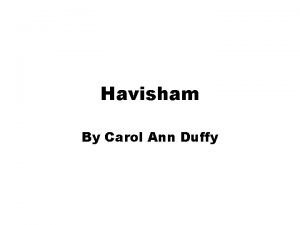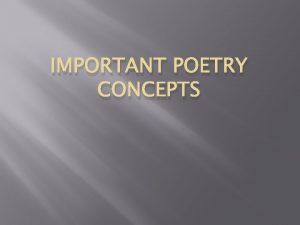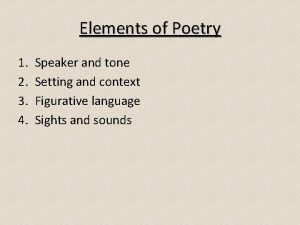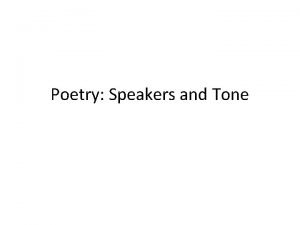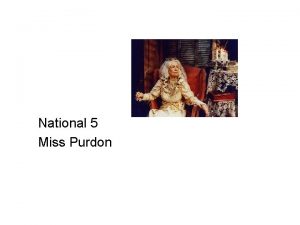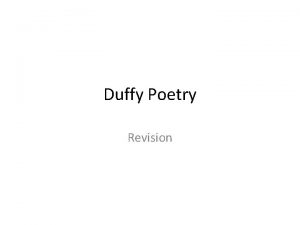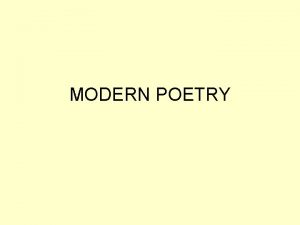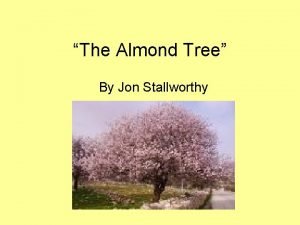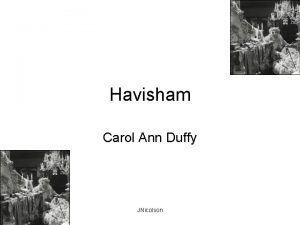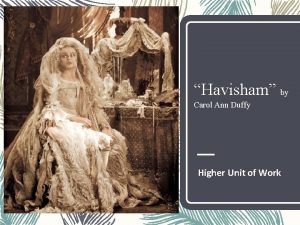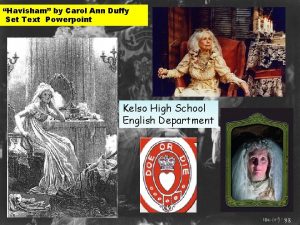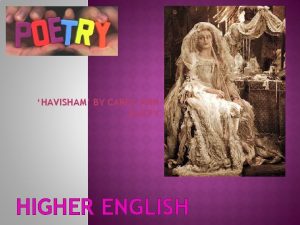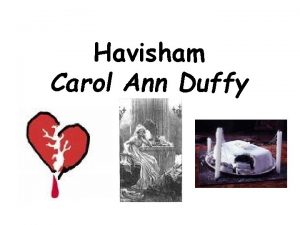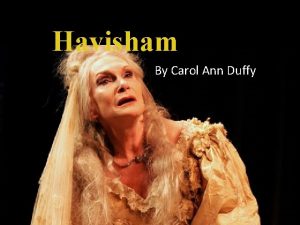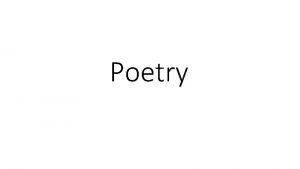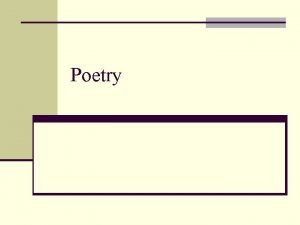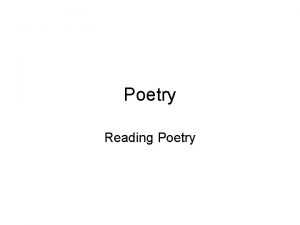Duffy Poetry Revision Havisham Havisham The speaker of



















- Slides: 19

Duffy Poetry Revision

Havisham

Havisham • The speaker of this dramatic monologue is the fictional Miss Havisham from Charles Dickens' Great Expectations. • Jilted by her lover, Miss Havisham spends the rest of her life decaying in her wedding dress amid the remnants of her wedding breakfast, grooming her beautiful niece Estella to exact revenge on all men. • Duffy has said that she titled the poem Havisham rather than Miss Havisham to separate the character from Dicken’s version – this is Duffy’s creation. Other interpretations of the title are possible: • the removal of Miss also removes reference to the character’s gender – it could be argued she no longer feels a woman • jilted on her wedding day she is in limbo – somewhere between a Miss and a Mrs, she is not actually either and has lost her role in life

Havisham Themes • The key theme in this poem is the corrosive nature of hatred on the human psyche. • In giving Miss Havisham a voice outside of Dickens’ novel, the poet is able to crystallise perfectly how the singular event of being jilted can completely shatter and destroy a human being. • The mood throughout is bitter and caustic as Duffy clearly conveys how quickly love can be replaced with hatred and violence. • The wedding imagery, the cake, the dress and the honeymoon, are all used to reinforce how experiences and events associated with joy can easily evolve into symbols of hate instead of love.

Mrs Midas

Mrs Midas • Mrs Midas is a poem written from the viewpoint of the wife of the mythological King Midas, from Ovid’s Metamorphoses. King Midas was granted a wish by the god Dionysus whereby everything he touched would turn to gold. • With comical undertones, a wide range of emotions are expressed through the persona of Mrs Midas as she speaks out against her husband’s foolish actions and gradually separates herself from him. • She leaves him to waste away in isolation while she laments the loss of their physical relationship and the chance to have a baby together to fulfil their dreams.

Mrs Midas The main themes are: • greed • consequences • isolation • Greed is certainly a recurring theme as this is what motivated Midas to make his wish in the first place. • The damaging effects are portrayed throughout with both husband wife, in the end, being left alone to suffer the effects of wishing to possess a substance which ultimately feeds no one. • Consequences are dealt with as we observe the impact of the gift on Midas and his wife. Duffy invites us to consider how something so precious like gold can easily become destructive. • Isolation and loneliness in the end is all that is left for either character.

Originally

Originally • In this autobiographical poem, Duffy considers and explores the sense of isolation and confusion she felt as a child when her family moved from the Gorbals in Glasgow to England. • She describes both the literal details of the journey and the move as well as the deeper, metaphorical journey that she and her family experienced as a result of this decision. • As the title suggests, she considers to what extent our identity is shaped and defined not only by our environment but by changes in dialect and culture. • The initial catalyst for the poem, the memories of the move and her gradual assimilation into her new home, provokes a bigger, more philosophical meditation on the subject of childhood itself. • Perhaps the most significant line in the poem comes at the start of stanza two when she asserts that All childhood is an emigration, revealing clearly the universal truth that the process of growing up is always synonymous with change.

Originally Themes • In this poem, Duffy reveals the importance of early childhood memories and experiences in shaping identity and also considers the impact of significant domestic changes during the formative years. • It is clear that even though Duffy was only six when she moved to England, her sense of Scottishness has stayed with her. • However, this affinity has resulted in a sense of confusion about her own identity and where she belongs and the poem is her own attempt to define more precisely where her true origins lie. • Although asserting that all childhoods involve change and transition, she feels a distinct pull towards this country that she left so young and there is a definite feeling of loss running through the poem. • In recalling how easily her brothers were able to adapt she emphasises her own sense of separateness.

Valentine

Valentine • Valentine is from a collection of poems entitled Mean Time (1993), and expresses love and affection in the form of a conceit whereby the symbol of love being offered by the speaker is an unconventional onion. • The poem challenges the stereotypical view of a Valentine’s gift when the speaker presents their lover with the metaphorical onion as a moon wrapped in brown paper. • This is reminiscent of metaphysical poets such as John Donne, who approached ordinary objects in original and surprising ways. The multilayered complexity of the onion represents a real relationship and is used as an extended metaphor throughout. • The strangeness of this unusual gift, which can make a lover cry, highlights the negative as well as the positive effects of a deep and loving relationship. • The forceful presentation of this gift, and the final word choice, also suggests this is a relationship which is cruel, domineering and menacing.

Valentine Themes • Like most of the poems in Duffy’s Mean Time collection, Valentine deals with those involved in damaged or irreconcilable relationships. • In Valentine, Duffy ends on a warning note that love can be Lethal and so life-threatening, forcing the reader to confront the notion that a real love based on honesty and truthfulness can be painful and destructive as well as fulfilling and enriching. • The allusion to the negative aspects of conventional relationships suggests that, ultimately, they can often be restrictive to the individual, while a love which is free from such constraints is an ideal worth pursuing.

War Photographer

War Photographer • Duffy was inspired to write this poem by her friendship with a war photographer. She was especially intrigued by the peculiar challenge faced by these people whose job requires them to record terrible, horrific events without being able to directly help their subjects. • Duffy perhaps shares an affinity with these photo journalists - while they use the medium of photography to convey certain truths about the human condition, she uses words and language to do the same job. • Duffy provokes us to consider our own response when confronted with the photographs that we regularly see in our newspaper supplements, and why so many of us have become desensitised to these images. • By viewing this issue from the perspective of the photographer, she also reveals the difficulties of such an occupation. • By the end of the poem, it is clear her subject straddles two vastly different worlds yet increasingly feels he belongs to neither.

War Photographer Themes • The poem focuses on two main themes: • the horror of war • our increasing indifference to the victims of conflict • These themes are revealed not only through Duffy’s word choice and imagery, but also through the central paradox that while the imagery of war is more widespread than any other time in history, its impact upon those of us exposed to it is rapidly declining. • • • The horror of war Duffy’s skilful yet understated imagery helps to convey the terrible personal stories that lie behind every conflict. Perhaps almost in an attempt to counter the graphic imagery that we have become so used to seeing, her depictions are subtle and understated and she often leaves the reader to compose their own images. Our increasing indifference to the victims of conflict Throughout the poem, Duffy conveys the increasing separateness and isolation the photographer feels both towards his own country and the newspaper he works for. Unlike us and his editor, he is unable to protect himself from the horror of the subjects he photographs and there is a sense of growing bitterness as he continues to feed the voracious need for news in the knowledge that we are increasingly unmoved and unaffected by the images.

Anne Hathaway

Anne Hathaway • Although Havisham was published a year earlier, it makes a good comparison with this poem since both take the perspective of a woman living without her lover - Havisham having been jilted at the altar, while Hathaway has been widowed. • Anne Hathaway was the wife of William Shakespeare. She was seven years his senior and already pregnant when the 18 -year-old, Shakespeare married her. • The poem begins with an epigraph taken directly from Shakespeare’s will in which despite being a man of some considerable property, he leaves Anne only his second best bed. • While some critics have viewed this as an insult, Duffy presents a new perspective, using the bed as a metaphor for the intense passion and romance shared by the couple. • The second best bed was in fact the couple’s marital bed, while the best was reserved for guests. Duffy imagines, then, that this legacy was the playwright’s last romantic gesture.

Anne Hathaway Themes • This poem deals has three main themes: • passion • sensual erotic love • death and remembrance • In the poem, Duffy really concentrates on conveying that this was a marriage based on an all - encompassing, deeply physical relationship. • She uses the physical legacy of the bed left by Shakespeare to his wife to meditate on this specific aspect of their relationship. • She presents a couple completely in tune with each other both sexually and emotionally. • Fittingly, in a poem about the world’s greatest ever poet and wordsmith, she uses language itself as an extended metaphor to convey the intensity of their passion. • As well as emphasising the profound physical connection of the lovers, Duffy also considers that the most fitting way to honour dead loved ones is by preserving the most enduring, vivid aspects of their character in our memories, thus allowing them to continue to survive.
 Havisham themes
Havisham themes Carol ann duffy havisham
Carol ann duffy havisham Passive revision
Passive revision Speaker poetry definition
Speaker poetry definition Speaker vs poet
Speaker vs poet Speaker elements of poetry
Speaker elements of poetry The speaker poem
The speaker poem Speaker's point of view in poetry
Speaker's point of view in poetry Havisham essay
Havisham essay Mrs havisham poem
Mrs havisham poem Dramatic monologue structure
Dramatic monologue structure Havisham poem analysis
Havisham poem analysis Experimentation in modern poetry
Experimentation in modern poetry Augustan poetry vs romantic poetry
Augustan poetry vs romantic poetry It is a poem which is comparatively short
It is a poem which is comparatively short Jon stallworthy the almond tree
Jon stallworthy the almond tree Conceit definition literature
Conceit definition literature điện thế nghỉ
điện thế nghỉ Fecboak
Fecboak Một số thể thơ truyền thống
Một số thể thơ truyền thống

